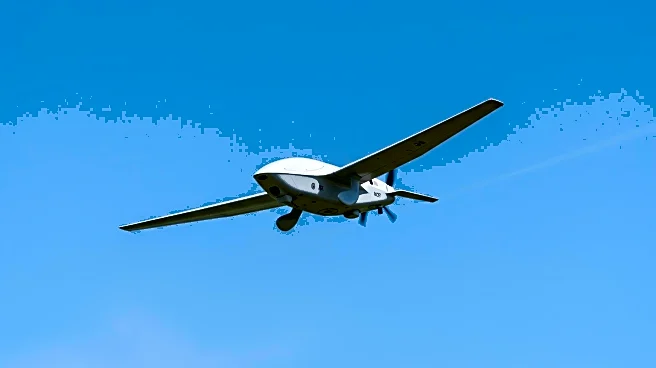What's Happening?
The UK Ministry of Defence (MoD) is advancing its 'loyal wingman' programme, focusing on Autonomous Collaborative Platforms (ACPs) to support the Royal Air Force's transition to a mix of crewed and uncrewed systems. This initiative aims to deepen the MoD's understanding of the ACP industrial landscape, including new systems, future capabilities, and associated costs. The programme follows the RAF ACP Strategy published in March 2024 and the introduction of StormShroud Mk1 in May 2025, marking the first ACP in service. ACPs are integral to the RAF's future, designed to assist fighter jets in surveillance and combat roles. The Strategic Defence Review (SDR) in June emphasized ACPs as crucial for maintaining the RAF's combat air leadership, recommending investment in ACPs alongside the Future Combat Air System.
Why It's Important?
The expansion of the 'loyal wingman' programme signifies a strategic shift in military aviation, potentially enhancing the RAF's operational capabilities and global defense posture. ACPs offer a cost-effective solution to augment traditional fighter jets, providing advanced surveillance and combat support. This development could position the UK as a leader in autonomous military technology, influencing defense strategies and procurement policies worldwide. The investment in ACPs reflects a broader trend towards integrating AI and autonomous systems in defense, which may impact global military alliances and defense industry dynamics.
What's Next?
The MoD's market engagement will likely lead to collaborations with defense contractors to develop and deploy ACPs. Stakeholders, including defense companies and international allies, may respond by investing in similar technologies to remain competitive. The RAF's integration of ACPs could prompt discussions on ethical and operational implications of autonomous systems in combat, potentially influencing future defense policies and international regulations.
Beyond the Headlines
The ethical considerations of deploying autonomous systems in combat are significant, raising questions about accountability and decision-making in warfare. The integration of ACPs may also drive technological innovation in AI and robotics, with potential applications beyond defense, such as in civilian aviation and emergency response.










